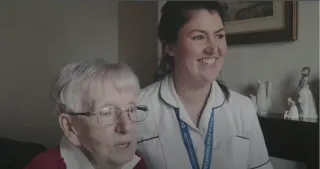Integrated health and social care services across St Helens
16 February 2021
Health and social care is typically delivered by individual providers such as a GP, hospital or local authority. All too often this siloed way of working leads to fragmented, delayed, inefficient and at times ineffective care.
The move to integrated care systems seeks the integration of health and social care but it requires staff within and across organisations to collaborate and work together to meet the needs of individuals.
This is only possible if professionals are able to share information on the people they care for and if that information is complete, accurate and easily accessible.
St Helens Shared Care Record for health and social care integration
Graphnet’s CareCentric shared care record is used and relied upon by health and social care professionals across the country such as the Contact Cares team in St Helens. This multi-disciplinary team is part of the St Helens Cares integrated care system and is the first point of contact for residents to access help and advice on their health and social care needs.
Staffed by over 350 social care and healthcare practitioners such as nurses, occupational therapists and physiotherapists, the Contact Cares team, ST Helens uses the shared record every day for timely and accurate information to care for their residents.
The record contains patient data from several care settings, including GPs, Community Services, Mental Health Services, Social Care and Specialist Services. Being able to access vital data quickly and easily in a single place is critical to support decision making. The record enables the Contact Cares team to provide the right care, in the right place, at the right time.
Benefit of integrated services in health and social care
The St Helens Shared Care Record makes a significant difference to the delivery of integrated care by the whole St Helens Cares system, as well as to Contact Cares staff and patients who rely on having complete information in one place.
Realised benefits of this approach include:
- Consistent reduction in Delayed Transfers of Care, the lowest in the North West
- Lower rate of growth in non-elective admissions, compared to rest of region
- Prevention of A&E attendance through step-up provision
- Sustained reductions in falls admission
- Improved joint care planning and co-ordinated service provision
"The access to information aids and avoids duplication of our services and therefore helps to avoid hospital admissions and readmissions by having discharge information to hand. The shared record makes us effective and gives us the ability to achieve a more timely outcomes for patients and service users."
Chris Blackburn, Contact Cares Advisor
Examples of integrated services in health and social care: Kath's story
Kath suffered a fall and was taken to hospital. After 48 hours, she was medically fit to be discharged from hospital and was admitted to a local rehabilitation centre for intermediate care. After leaving the centre, she returned home and her care continued in the community.
"When I walked upstairs on my own, it was another step that I didn't think would be possible. But when I thought I could do that myself, I thought wow a miracle. And I could shower and I could use the toilet, I thought it was wonderful.”
Alison, occupational therapist:
“With Kath, everyone coming together and working jointly as a team has improved her experience of NHS and social services and we've all worked together to achieve her personalised goals and what she wants to do.”
Integrating health and social care across the country
St Helens is one of many integrated care systems enabled by Graphnet’s shared care records across the country.
In Greater Manchester, care professionals are using integrated care and support plans within the GM Care Record to undertake advance care planning for those with long-term conditions or nearing the end of their life. For example, paramedics, when responding to a call-out are able to see whether someone is on an end of life pathway, look up their preferences and respond accordingly.
Virtual wards are being set up for targeted intervention. In Frimley and Berkshire West, for example, they are managing virtual wards to monitor Covid patients remotely using pulse oximetry.
In Cheshire, the North West Ambulance Service is accessing the Cheshire Care Record on the road using paramedic tough-books to inform direct patient care.
Graphnet holds shared care records for over 20 million people that are used to support 20,000 patient care encounters every day. Integrated care records make information available where and when it is needed and improves the speed, quality and safety of care across health and care economies.
Contact us to learn how Graphnet’s integrated care solutions can help support your community.

Watch the St Helens story
"The access to information aids and avoids duplication of our services and therefore helps to avoid hospital admissions and readmissions by having discharge information to hand. The shared record makes us effective and gives us the ability to achieve a more timely outcomes for patients and service users."
Chris Blackburn, Contact Cares Advisor











